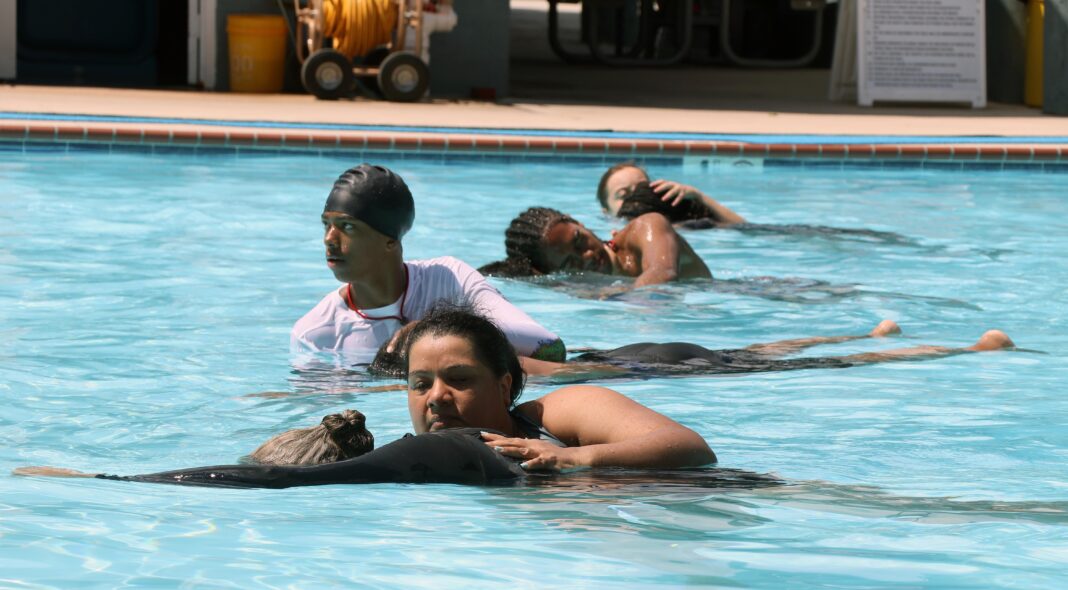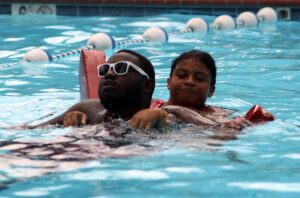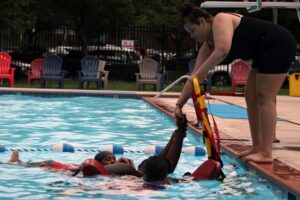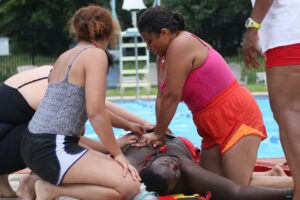Trenton was in a unique position as many other areas across the nation, like Philadelphia and the Jersey Shore, faced lifeguard shortages. However, with over 70 guards spread throughout Trenton to different pools, the city was able to provide 12-hour pool days to keep residents cool, calm, and happy.
The City of Trenton provides a free training course to any Trenton youth looking to become a lifeguard. It is publicized through the school systems as a way for students to make money over the summer break. The program serves as two-fold recertification for those already working as lifeguards and a training boot camp for those looking to start.
It starts with students like Eliana Ramos, a fifteen-year-old who was a part of the Bootcamp lifeguard training course. “Every time I come to the pools. I always see lifeguards and stuff, and I always wanted to know what the experience is like… So I signed up,” Ramos said.
In charge of training the recruits is Michelle Purvis, a lifeguard training instructor for the American Red Cross who works as a consultant for the city of Trenton and is the head swim coach for Trenton Central High School.
She explains what the training entails. “Day one, you do basic rescues with your active victim at the surface, a passive victim at the surface. Then day two, you do pass adverse victim submerge,” Purvis said. Throughout the week, they drill on how to provide care in and out of the water. The practice First aid, CPR, and other life-saving skills.
During this interview, she was on break during day three when teaching how to work with spinal injuries. “Tomorrow we concentrate 100% on CPR, then we do tests on Friday,” Purvis said.
The final day is challenging for the recruits; it includes a written test, first aid training, and live testing. One of the most challenging parts is the live testing, where seasoned lifeguards huddle together to create different scenarios the rookies would face in the field.
“I put the participants in the lifeguard chairs, “Purvis said, “and the lifeguards who are certified and working become the patrons in the water…They do not know what will happen, and they have to react.
Current lifeguards to recreate the open Trenton pool. They talk to the new life guards, run where they should walk, ask where the bathroom is, and try to distract them from what happens in the pool.
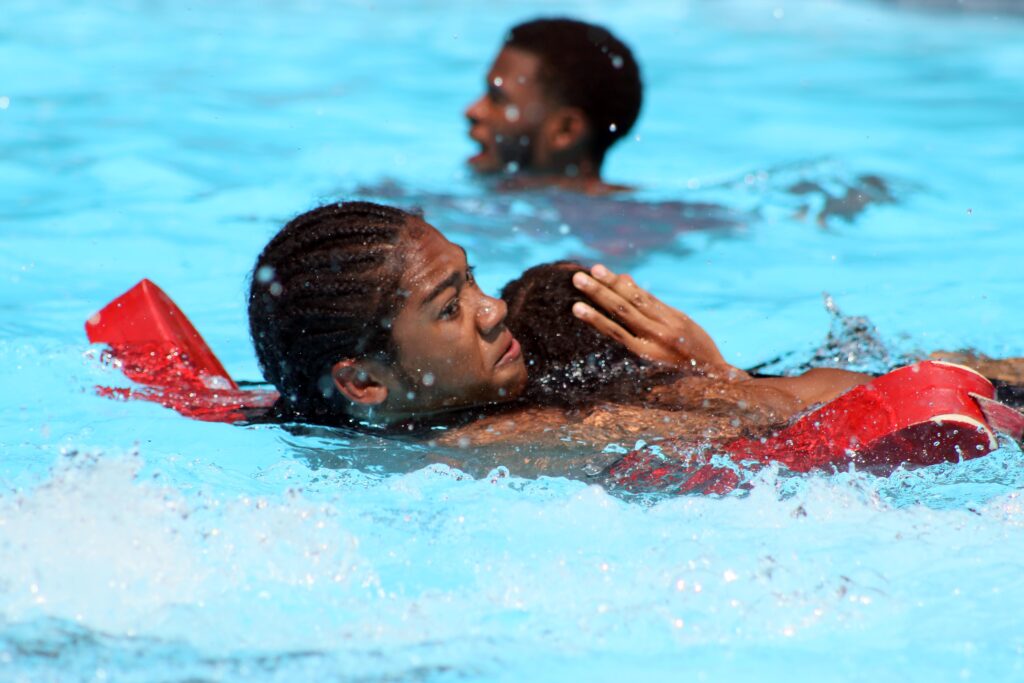
“(Puvis is)looking for us to be ready and prepared,” said Jordan Tejeda, a lifeguard in training.” Looking for us to jump into action because when you’re becoming a lifeguard, you need to know what you need to do.”
During the chaos, a type of drowning will occur, and the new Lifeguards must react. Each Lifeguard-in-training has a different area where they scan for trouble, looking for signs that someone is drowning. Maria Ashantal Reyas, Lifeguard Trainee, had a part of the deep end.
One swimmer goes under the rope, and she blows her whistle for him to back into the shallow end. He doesn’t comply and instead starts to splash around before going under and not resurfacing. Reyas jumps into action, diving in with her flotation devise to save the man.
“I had to save a submerged victim who went under the ropes,” Ashantal Reyas said. “So you need to watch out because some kids will hang on to the walls and go on to the ropes, and they will go under with their friends because they think it’s not that deep.”
She reached the victim and began to swim him ashore. However, she wasn’t strong enough. “I had to call for help because he was too heavy for me. You shouldn’t be afraid to call for help because you need to get him out to help.” Together, Ashantal Reyas and her team pulled the victim out of the water, administered first aid and CPR, and passed thier exam.
At the end of each scenario, they went over the recording. The lifeguards in training can work as lifeguards at any pool, but work is still to be done.
Photo: Trenton, NJ: Ashantal Reyas, a lifeguard in Training, participates in a simulation of a drowning victim. She and her team work to get the victim out of the water to perform CPR. Photo | Drew Mumich
Ed Butler, the pool coordinator for Trenton Public Pools, explained that it is the duty of the veterans to keep their skills sharp. “These young rookies are now becoming lifeguards… it’s the responsibility of the red shorts, who are the lifeguards, and the blue shorts, who are the managers, to now break them into the rules and regulations of the pool,” Butler said.
Managers like Kevin Jacobs, who has worked as a Lifeguard since 2005, and Briana Hernandez, who has been a lifeguard since 2012, help break in and teach the rookies.
“You should be doing at least three emergency action plans every week. And so you can get the guards nonstop up to date too, basically, make sure they are doing it right,” Jacobs said.
Hernandez adds, “you have to stay up to date with these skills. So it’s very important because if something bad happens, you should always be ready no matter what… They’ve been practicing and stuff, so you know, as long as they always come back and try, we can improve their skills.”
At the end of it, all the trainees become rookies and are proud to serve the city, “I think it’s a great thing that the city of Trenton has these programs because it gives us youth and young adults something to do, something to learn, and something positive to working on,” Ramos said. “If you were looking into starting training to become a lifeguard, you should just believe in yourself.”

